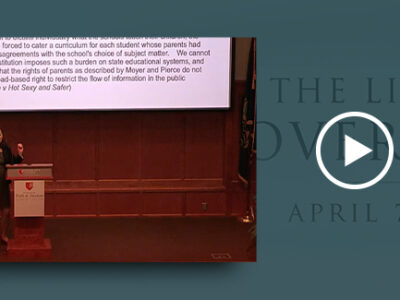Editor’s Note: The “V&V Q&A” is a monthly e-publication from The Center for Vision & Values at Grove City College. Each issue will present an interview with an intriguing thinker or opinion-maker that we hope will prove illuminating to readers everywhere.
This month’s “V&V Q&A” features an interview by Dr. Paul Kengor, executive director of The Center for Vision & Values, with H.W. Crocker III, on Crocker’s latest work, “Don’t Tread on Me: A 400-Year History of America at War, from Indian Fighting to Terrorist Hunting” (Crown Forum, 2006).
Q: Mr. Crocker, why did you write this book?
H.W. Crocker III: I wanted to write a history that a soldier, sailor, airman, or Marine (or his wife, girlfriend, or mother), might enjoy—to put his own sacrifice and service into perspective, in the context of history.
And I wanted to write a stirring, pugnacious account for the general reader that puts to rest liberal myths about our past and shows that the continuing theme in American history—from the Indian-fighting of the 17th century to our terrorist-hunting of today—is “Don’t Tread on Me.”
Q: What will surprise readers the most?
Crocker: Well, as one reviewer said, “There is something in this iconoclastic book to offend just about everyone.” So take your pick, it could be that the founders were frank imperialists (and that’s a good thing), or that the South was right in the War Between the States, or that we should have annexed Cuba and the entirety of Mexico, or that toppling Saddam Hussein was a good thing—and that we don’t need to worry about a civil war in Iraq, as long as we’re not involved in it, because we should have partitioned the country anyway. An historian should have reminded Bush & Company that divide et impera is still good policy.
Q: You say that America’s founders were “ardent imperialists.” What do you mean by that?
Crocker: John Adams, Benjamin Franklin, Thomas Jefferson, Alexander Hamilton (in Federalist One), and George Washington all speak of America as an empire, an empire of liberty (in Jefferson’s phrase) that they envision growing bigger and stronger than the imperial Mother Country, and perhaps even putting shackles on her (Franklin). Even the most pacifically minded of them (Jefferson) wanted to annex Canada.
Q: A negative of the American Revolution is that you claim that it later justified Southern secession in the 19th century. Please elaborate on that.
Crocker: Actually, I would have been a Tory in 1776. I don’t think I could have brought myself to rebel against king and country. Neither could Rogers’ Rangers, by the way—so I’m in good company.
In 1861, I would have sided with the Confederacy. Like Robert E. Lee, I would have opposed secession, but opposed even more the idea—or the reality—of killing my fellow Americans to keep them within the Union. As Lee said, “a Union that can only be maintained by swords and bayonets… has no charm for me…. If the Union is dissolved and government disrupted, I shall return to my native state and share the miseries of my people and save in defense will draw my sword on none.”
It seems to me that he took the position that every humane man could—or should—echo: “With all my devotion to the Union and the feeling of loyalty and duty as an American citizen, I have not been able to make up my mind to raise my hand against my relatives, my children, my home.”
So spoke a man who had served the flag of the United States his entire life, a West Pointer, a former superintendent of West Point, and a veteran of the Mexican War.
Lee venerated George Washington. And Washington is on the Great Seal of the Confederacy. The American War of Independence was the precedent, to Southern minds at least, for Southern Independence.
Q: But by supporting the Confederacy, would you not have supported slavery?
Crocker: Robert E. Lee thought that slavery was a moral and political evil—but that Americans resolved such problems through moral suasion, the melting influence of Christianity, and well-meaning compromise. That, rather than 600,000 dead, seems to me the humane approach. The problem with using slavery as an historical moral trump card—as people casually and self-righteously do today—is that if that’s the case, then the British, not the Americans, were the righteous party in the American War of Independence. The British were quite happy to free the slaves as a wartime measure (just as Lincoln’s emancipation proclamation was a wartime measure). The historical reality—life as it was actually lived by the people concerned—is rather more complex and humane and interesting than a casual dismissal of 600,000 dead as a mere bagatelle compared to America’s necessary historical, legal, moral, social, and Constitutional progress.
Q: Even if annexing Mexico and Cuba might have been arguable at the time, surely it would be a mistake today, right?
Crocker: If you were a Cuban, you might think Puerto Rico got the better deal out of the Spanish-American War. And our failure to annex Mexico merely means that Mexicans keep coming here. That’s often the way history works.
Q: Can we defeat the threat of radical Islam?
Crocker: Yes. We’re doing a decent job on the battlefield, but we’re not doing a very good job on the political front, because the West lacks confidence in its own values. The lesson of history is that radical Islam is restrained when it has to accommodate itself to the West—that was the neat trick of the British Empire—and that should be our demand. We in the West shouldn’t trim our sails to suit radical Islam. In Cold War terms, we can’t allow ourselves to be Finlandized.
Q: What’s your next book project?
Crocker: Aside from histories, I write novels. When I wrote The Old Limey (a comic novel) it was chosen by Barnes and Noble for its “Discover Great New Writers” program, and I’m very fond of it and meant to follow it up with sequels. But I’ve been distracted by these massive histories I’ve been called upon to write. Next year, though, I hope to finish a World War II thriller that I’ve been kicking around. It’s a thriller with some comic touches, since I find those hard to avoid.



